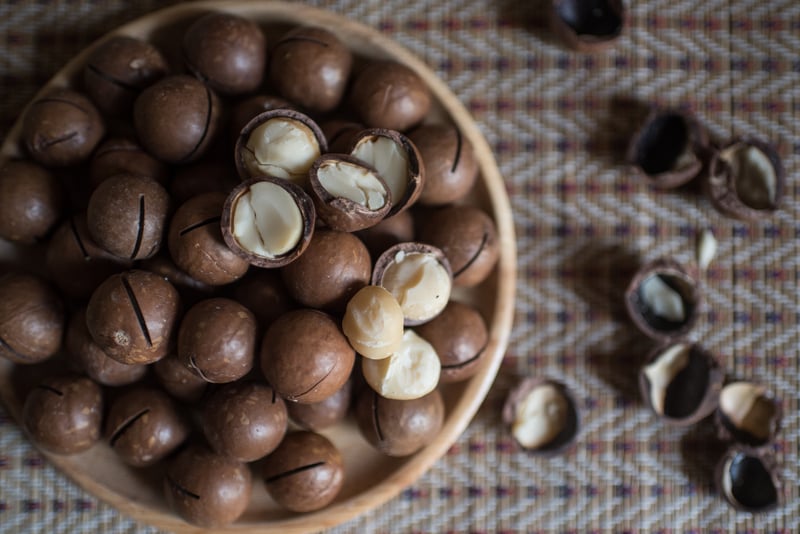12 Foods That Regulate Blood Sugar (see the list)

You don’t need to be diabetic or hyperglycemic to care about blood sugar levels. Spikes, followed by dramatic drops in blood sugar, affect everyone’s energy level, productivity, and how they feel. Plus, when blood sugar isn’t regulated over the long term, it can increase the risk of numerous health problems such as diabetes, of course, but also heart disease, loss of vision, and kidney disease. In other words, regulating blood sugar levels can be one of the most important tools to help you feel your best and promote long-term health.
What’s more, diabetes is an ever-growing concern in this country. The Centers for Disease Control and Prevention (CDC) has found that 13% of adults in the U.S. have diabetes and another nearly 35% are prediabetic.
Of course, if you are already experiencing health issues due to irregular or high blood sugar levels, it’s even more important to take steps to regulate blood sugar. One of the first places to start is with your diet.
Foods That Spike Blood Sugar Levels
You probably already know that foods high in sugar cause blood sugar levels to skyrocket. So, to reduce blood sugar spikes, limiting foods like candies, cakes, and cookies is obvious. Less obvious are some of the other common foods that can lead to increased blood sugar levels. These include:
- Refined grains, such as white bread, bagels, pasta, and rice. Because these foods have had their fiber removed, they are digested more quickly, which can increase blood sugar levels soon after eating.
- Sugar-sweetened drinks, such as sodas, sweetened teas, and even fruit juice (especially fruit juice “cocktails,” which tend to contain little actual fruit juice).
- Fast food is not only high in calories and fats, it’s also high in sugar and other refined carbohydrates. Surprisingly, some fast-food burgers contain as much sugar as a candy bar. The buns, breading, and condiments are all hidden sources of sugar. Add fries and a soda, and you can really see blood sugar levels spike.
Other foods that can raise blood sugar levels if overeaten include sweet fruits (especially dried fruits like raisins or apricots) and starchy vegetables like corn, potatoes, and sweet peas. Dairy alternatives can also provide more of a blood sugar increase than many people expect. Oat milk, for example, can have a glycemic index that’s as high as straight glucose.
That doesn’t mean you need to cut them from your diet as many of these foods are also rich in nutrients, including fiber. However, it is important to be aware of the effects the foods have on your body and to combine them with lower blood sugar increasing foods like quality proteins and healthy fats.
12 Foods That Regulate Blood Sugar
1. Non-Starchy Vegetables and Fruits
They help fill you up, provide loads of nutrition, including essential vitamins and minerals, and help regulate blood sugar. Enjoy them fresh, canned, or frozen, but do watch for sauces that may impact how much they can control blood sugar. Some great choices include:
- Avocados
- Broccoli
- Cauliflower
- Cucumbers
- Okra
- Tomatoes
- Zucchini
- Onions
- Mushrooms
- Artichokes
- Asparagus
- Celery
- Green beans
- Olives
- Squashes
2. Leafy Greens
You don’t have to love a big salad as much as Elaine from Seinfeld (or Coach Cristina) to get big benefits from leafy greens. Again, they’re loaded with nutrients like vitamin C, antioxidants, and fiber, and they also won’t affect blood sugar levels even with a hefty serving. Favorite leafy greens include:
- Kale
- Spinach
- Romaine lettuce
- Arugula
- Swiss chard
- Collard greens
- Mustard greens
- Bok choy
- Dandelion Greens
- Cabbage
3. Beans and Lentils
Another type of food rich in blood-sugar-regulating nutrients includes beans and lentils. They provide fiber, protein, and magnesium as well as soluble fiber and resistant starch, which helps slow digestion to improve the response of insulin after meals. Some quality beans and lentils to add to a healthy diet include:
- Black beans
- Chickpeas (aka Garbanzo beans)
- Pinto beans
- Lima beans
- Red kidney beans
- Lentils
- Dried peas (e.g., black-eyed peas or split peas)
- White beans
4. Fatty Fish and Seafood
One of the healthiest foods you can eat due to their wide-ranging benefits, fatty fish provide loads of nutrition. This includes omega-3 fatty acids DHA and EPA, which promote heart health by protecting blood vessels and arteries and reducing inflammation.
If you already have diabetes, fatty fish can even be more important for a healthy diet, as diabetes doubles the risk of heart disease or stroke. What’s more, because fatty fish is a quality source of protein, it may help you feel fuller for longer, so weight management becomes easier. Some fatty fish to add to the menu include:
- Wild-caught salmon
- Atlantic mackerel
- Albacore tuna
- Pacific sardines
- Cod
- Herring
- Rainbow trout
- Mussels
- Oysters
- Pollock
- Sablefish
However, to help protect against mercury and other contaminates, it’s best to severely limit or avoid some fish like shark, swordfish, king mackerel, tilefish, and orange roughy.
5. Nut and Nut Butters
Because most nuts are high in fiber, low in digestible carbs, and high in healthy fats and protein, they help regulate blood sugar. Some favorites include:
- Walnuts
- Pistachios
- Almonds
- Brazil nuts
- Hazelnuts
- Macadamia nuts
- Pecans
- Cashews
Remember, however, that nuts can also be calorie-packed, so keep an eye on your serving sizes.
6. Seeds
Another food that’s rich in fiber as well as healthy fats and protein is seeds. Some of the best seeds to eat regularly include:
- Chia seeds
- Flaxseeds
- Hemp seeds (aka hemp hearts)
- Pumpkin seeds
- Sesame seeds
- Sunflower seeds
7. Eggs
Another protein and healthy-fat food that helps regulate blood sugar is the humble egg. What’s more, eggs have been found to help improve insulin sensitivity and decrease inflammation by providing antioxidant benefits. Don’t skip the egg yolk, though, as that’s where many of the nutrients are concentrated.
8. Spices
Not only do they add rich flavor and variety to the same old, “boring” foods, but spices can be powerful health-promoting tools. Some top spices to include in your blood-sugar regulating diet include:
- Cinnamon
- Turmeric
- Black pepper
- Ginger
- Fenugreek
- Garlic
- Curry
SPECIAL OFFER: Ageless Turmeric Supports Healthy Inflammation Levels & Detoxification. Now Up to 71% Off.
9. Probiotic-Rich Dairy
With the benefits of quality protein combined with probiotics, fermented dairy products are low in sugar and help support a healthy gut. In turn, low-sugar probiotic-rich dairy products help regulate blood sugar levels. Try:
- Greek yogurt
- Plain yogurt
- Kefir
- Buttermilk
10. Whole Wheat or Pumpernickel Bread
While refined, white breads are sure to raise blood sugar levels, bread made with 100% whole, stoneground wheat or pumpernickel doesn’t have the same effect. It’s much lower on the glycemic index scale, clocking in at 55 or less. The reason they have less of an impact is because they’re simply processed less, so they leave the fibrous outer shells of the grains intact. This, in turn, slows digestion to help level out blood sugar. Other blood-sugar-regulating grain options include:
- Rye
- Spelt
- Emmer
- Einkorn
- Oats
- Oat bran
11. Berries
If you’re looking for something to crush your sweets cravings without boosting blood-sugar levels, berries are one of your best bets. They’re loaded with nutrients, including antioxidants, which have been shown to help level out insulin after a meal. Plus, they’re lower in sugar than many other fruits. Some tasty treats to enjoy include:
- Strawberries
- Raspberries
- Blueberries
- Blackberries
Other non-berry types of fruits that help regulate blood sugar levels include apples and citrus fruits such as oranges and grapefruit.
12. Vinegar
Vinegar has been shown to help slow sugar absorption, which may help regulate blood sugar and increase insulin sensitivity. While much of the hype has been about apple cider vinegar (as it’s the most well-studied), because all vinegar contains high amounts of acetic acid, other varieties may also be worth adding to your meals to help regulate blood sugar, including:
- Balsamic
- White wine
- Red wine
- Rice vinegar
- Malt vinegar
So, you can choose the vinegar that works best with your recipe.
Other Factors That Regulate Blood Sugar
While diet is an important part of maintaining healthy blood sugar levels, that isn’t the only factor. Blood sugar levels can also be affected by:
- Body weight
- Activity and exercise levels
- Stress
- Illness
- Genetics
- Hydration levels
- Portion sizes
- Skipping meals
- Sleep
To help support healthy blood sugar levels, in addition to eating foods that regulate blood sugar and enjoying a moderate to low carb diet, maintain an active lifestyle, manage stress levels, drink plenty of water, eat smaller portions (and don’t skip meals), eat more protein and fiber, get enough quality sleep, and maintain a healthy body weight for you.





 7 Signs Your Body is Seriously Low on Collagen (not just wrinkles)
7 Signs Your Body is Seriously Low on Collagen (not just wrinkles) Health Expert: "Turmeric Doesn't Work (unless...)"
Health Expert: "Turmeric Doesn't Work (unless...)" 3 Warning Signs Your Probiotic Supplement is a Total Waste
3 Warning Signs Your Probiotic Supplement is a Total Waste

